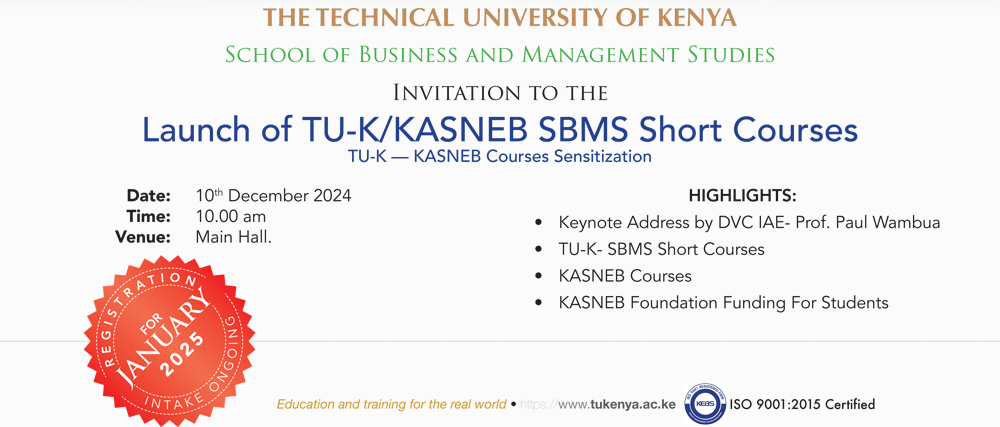



Faculty of Social Sciences and Technology (FSST)





Prof Collins Miruka
Director , School of Business and Management Studies
Professionalism at all levels of management of human, capital and material resources are key to the success of the national economy ...>>More about the School...
Departments

School of Business and Management Studies participates in Webinars on Data Science and Technology, Revenue Allocation Bill, Policy Trends in Corporate Taxation and The Role of Board of Directors in Business Recovery.
WEBINARS

School of Business and Management Studies hosted guest speakers Mr Don Omondi, Board Chairman AfriDSA and acturial Analyst Insurance, Mr Soita Juma Chairman, Micro and Small Enterprise fund (MSEF) and Ms Irene Onchwati CEO UnieCc and certified etiquette consultant. The guest speakers engaged in a very enriching discussion on the role and importance of data science in the business enviroment.
 CPA Dr. Joan Lilian Ogendo is the author of
CPA Dr. Joan Lilian Ogendo is the author of
https://www.palgrave.com/de/book/9783319520353 and
https://www.morebooks.de/store/gb/book/balanced-scorecard-in-strategy-implementation/isbn/978-3-659-86069-0,
the Founder & CEO of Emerald- El Jay Management Consultants Ltd, an organization that offers psychotherapy services among others. Her areas of research interests are strategy implementation, corporate governance, balanced scorecard, emerging markets, knowledge management, international business, business ethics and the big five personality traits. She was one of the speakers at the IV International Meeting of Management Webinar 2020, who addressed the concern on The Role of Board of Directors in Business Recovery: International Perspectives on Corporate Governance. She gave her remarks as follows.
The Board of directors is the key element of corporate governance. The board members are chosen based on the models of board of directors used by different companies in varied countries. The ideal size of the board is between five and fifteen directors classified into executive, independent, proprietary and other external directors who are neither independent nor proprietary directors. The independent directors should represent at least half of the board. The diversity of knowledge, experience and skills are a concern. At least 30% of the total number of board members is the appeal for gender diversity. The academic disciplines to study corporate governance involve economics, finance, accounting, law, management, psychology, information technology and sociology. The different roles of the corporate board involve strategy, service, control and access to resources. The current role of the directors in business recovery should engross the support of existing continuity plans and their adaptation to the COVID-19 health threat; and also the focus on employee well being. The SDGs 1,2,3,4 &5 on poverty reduction, hunger reduction and good health (emotionally, psychologically and physically); competences and parity in gender are relevant at this time in order for organizations to achieve their learning & growth perspective among other organizational performance indicators.

The Kenya Senate has been in a stalemate, unable to dispose of the National Revenue Allocation Bill that was brought to the house by the Budget and Finance Committee. For the tenth time, the Senate has not been able to resolve this matter, the bone of contention being whether land mass or population should higher allocation. The Commission on Revenue Allocation (CRA), while developing revenue allocation formula for the current period, considered that sparsely populated areas had not received much attention with respect to investment capital since independence. Thus, the Commission gave higher weight to the parameters on poverty and untapped potential. The Senate Budget and Finance Committee reversed CRA's preference. That's what precipitated the stalemate. In an effort to break the stalemate, a group of bipartisan experts on revenue matters was put together to think through this issue, and guide the politicians on the way forward. Dr Vincent Ongore, a member of School of Business and Management Studies was among those nominated to engage with politicians on a matter as weighty as National Revenue Allocation.

School of Business Lecturer, Dr Vincent Okoth Ongore also a senior partner at Corporate Africa Consulting House was among the panelists of the Webinar that discussed on Policy Trends in Corporate Taxation. Dr. Ongore was invited to this forum as a former high ranking KRA official, with hands-on experience in 'bolts and nuts' of revenue administration, and tax advisory. He gave his remarks as follows.
The last decade (2010-2020) has witnessed tax policy ambiguity in Kenya, characterized by frequent and unexpected changes in Tax Law. Some of these policy changes have extended generous incentives to taxpayers and investors, others have clawed backed substantial portions of the incentives, yet others have completely reversed the incentives. This ambiguity has posed a huge challenge to investors who are left wondering what the tax policy trajectory and fiscal landscape is likely to be in the long term. Consequently, long term investment decisions have been held back awaiting clarity of tax policy. It's against this background that a decision was made to bring together policy makers, policy implementers, tax and investment consultants, thought leaders and stakeholders, under the auspices of Strathmore Tax Research Center, to interrogate tax policy trends in the critical areas of: 1. Investment Incentives, 2. Digital Services Taxation, 3. Minimum Tax Regime, 4. International Tax Trends and Kenya's Agenda on the same, 5. Multilateral Agreements on Exchange of Information on Multinational Enterprises, and 6. Taxation Framework for Micro, Small and Medium Enterprises ( MSMEs).
Copyright © 2023 - Technical University of Kenya - School of Business and Management Studies
